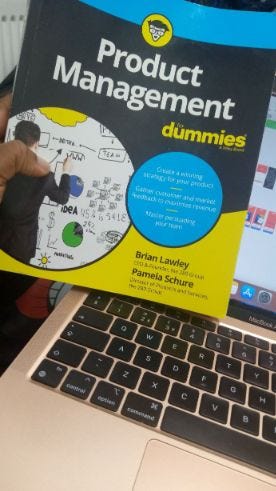Product management is indeed an exciting role. It presents loads of opportunities and helps you develop lots of skills from people skills to strategy to communication to development and so much more. As much as this is true, it is easy to get overwhelmed and lose track of essential aspects of your role.
This article is inspired by a book I am currently ready titled Product Management for Dummies by Brian Lawley and Pamela Schure.
#OneChapterADay

I will be sharing key insights from the book and talking about my experience as well. Though I am still in the early stage of my product career as a product manager, I have had my share of the product world as a developer
So!! Let’s dive right in 🚀🚀
❌ Mistakes PMs make
- Not Listening

Yes, we know that as a Product Manager (PM), you probably know the best for the product or should I say, the best trajectory. Now, as much as this might be true, it is important to note that listening is an essential tool.
Listen Up!!
You do not know it all — talking too much may lead to you missing out on the nuances behind what team members are saying. If you are the type of PM who loves talking more than listening, then this is a sign to take a class on people skills to be effective in your role.
2. Obsessed with only features:
I feel stabbed at this point 🤣 — Guilty as charged!!

Yes… as PMs, we love live products, but most times, especially for those with technical backgrounds, we tend to sweat the small details. Not that it is not important, but you also need to realise that sometimes you need to step up and be the strategic leader for the products to ensure overall success.
“Don’t make the mistake of zeroing in on the trees and missing the forest.”
Focus on features but also take into account the future of the product and many times to create a sustainable future it takes more than just features.
3. Reinventing the wheel
I feel like all the points are out to get me, but it is fine I have learnt my mistakes 🥲
So!! Reinventing the wheels — Yes!! Many of us have found ourselves doing this at some point. I know I have had this experience where I felt like I needed to create my own templates, start my own documents and even try to create a PM process from scratch, but at some point, I realised that these are things already available and done by others.
Delegation is not only about you giving tasks to people to ease their stress. Sometimes it’s just you leveraging templates people have already created to save you time and energy.
4. Being a product janitor rather than a product manager.
I honestly never knew this was a thing until I encountered this book. I have heard the term “Product janitor” once or twice but never really understood what it meant. So basically as a PM, there are times when you would need to learn how to say “no” — why?? because rather than having a strategic focus in your job you will do low-level tactical work and end up cleaning the mess others have created making you a product janitor 🧹.

Learn to delegate and prioritise.
5. Not engaged in continuous learning.
I feel like some people actually try to learn when they are on their way to landing their first role either as a PM or another other career but immediately after they land the role they desire, they get carried away.
Continuous learning is a non-negotiable trait as a PM — why???
Well… You need to understand that product managers come from different backgrounds and with different backgrounds come different gaps in knowledge. so you see situations, where PMs with a history in sales excel at communication or with experience in business, do well in strategy. Another from engineering excels when it comes to product features.
“Knowing you have gaps in your skillset is fine, but continuing with what you know and not enhancing all the skills that build a successful product manager isn’t”
As a PM you are tasked with improving your skills; take a course, join a community, join a PM challenge, pick a problem and try to find a solution. No matter the level you find yourself in your PM career, this kind of training is essential to develop your PM skills.
6. Not seeking help
I have learned to embrace the fact that life wasn’t meant to be done alone and I have tried to apply this principle in every aspect of my life. As a PM it is important you have a coach or a mentor — someone to guide and help you navigate this large ecosystem called the product world. Resist the urge to forge ahead blindly rather than leverage other people’s experiences and tap into their insights. Learn what works and what doesn’t on time to avoid such mistakes in your own journey.

The product world is too big for you to walk alone. You need someone to have your back at every point in time.
7. Never talking to customers
As a PM you represent the users/ customers. You own the voice of the customer in your team and are tasked to advocate for the customer’s needs. Remember you are building products to solve the problem of real people, not robots so it is important you prioritise communication and conversations with your customers — Schedule it!! daily, weekly, monthly etc. This adds to your credibility.
8. Not owning the Whole Product
I actually have a personal experience with this. As a PM when I had just joined the company did not get the chance to make significant decisions when it had to do with products we were working on as a team. I noticed it was more of a feature-based development scenario where the CEO tell the development team what to develop based on preferences and perceived standards. One day I picked up one of the products and decided to take initiative and create a focus around the product. I create a Product Requirements Document (PRD) because it was so obvious that there was no structure and at the end of the day the CEO loved it and it made the journey smoother and more effective.

As a PM no one has the 360-degree view of your product that you do. It is your duty to everything around: strategy, competitive environment, support, challenges, pricing, how the sales team are representing the product and much more — this is far beyond just the product’s feature list. Challenge other team members outside the traditional sphere of influence that the organization has set for you.
Have you made any of the above mistakes before? Do you have other mistakes you would like to share with fellow PMs please let’s hear from you in the comments.
👇🏽👇🏽👇🏽👇🏽
🖥️ Resources to help you grow as a PM
- Free resources and courses on product school
- Product management guide on Aha!
- Learn Product management with The Product Folks
- Get free ebooks on products on PdfDrive